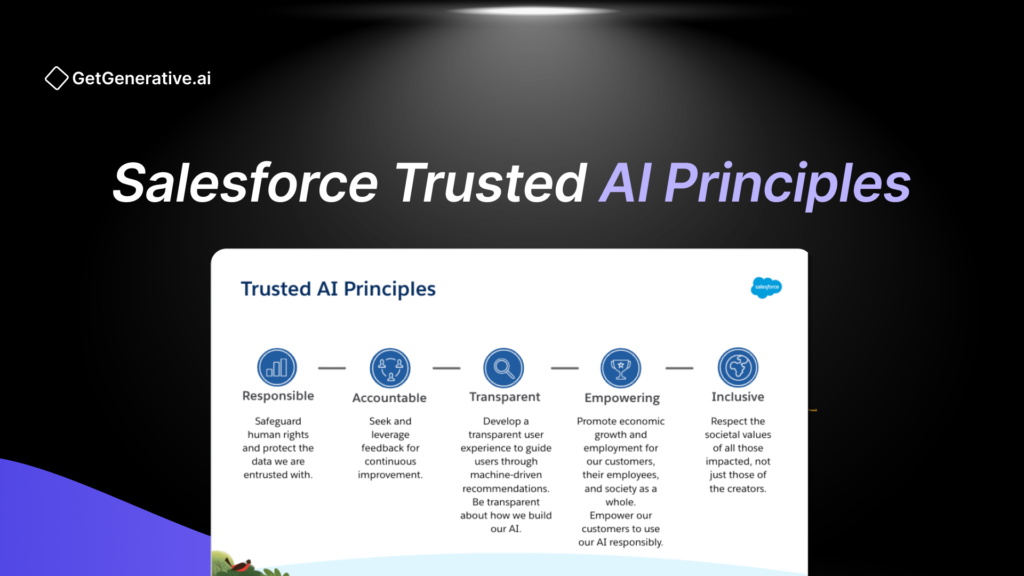Salesforce Trusted AI Principles
Salesforce is committed to responsible and ethical AI practices. The company has crafted its Trusted AI Principles to ensure that its AI technologies not only drive innovation but also uphold values of trust, fairness, and inclusivity.
Let’s explore these principles and their implications in detail.
Understanding Salesforce’s Trusted AI Principles
Salesforce’s Trusted AI Principles revolve around five core tenets: Responsible, Accountable, Transparent, Empowering, and Inclusive. These principles are designed to foster ethical AI practices while aligning with the company’s overarching values of trust, customer success, innovation, equality, and sustainability.
The Core Principles of Trusted AI
1. Responsible AI Development
Salesforce prioritizes safeguarding human rights, ensuring data protection, and adhering to strict security standards. Before implementing any AI feature, the company evaluates not just its feasibility but also its ethical implications. Key practices include:
- Collaborating with human rights experts.
- Developing tools to identify and mitigate biases.
- Complying with AI laws and maintaining high privacy standards.
2. Accountability to Stakeholders
Accountability is a cornerstone of Salesforce’s Trusted AI Principles. The company seeks external feedback and actively collaborates with industry experts to refine its AI practices. This involves:
- Engaging with ethical AI councils and advisory boards.
- Incorporating customer feedback to improve products.
- Participating in global discussions on AI ethics and governance.
3. Transparency in AI Systems
Transparency builds trust by helping users understand AI-driven decisions. Salesforce achieves this by:
- Publishing model cards that outline the creation, intended use, and ethical implications of AI models.
- Ensuring customers retain full control over their data.
- Providing clear explanations of Salesforce’s AI capabilities.
4. Empowering Users with AI
Salesforce believes that AI is most effective when it enhances human potential. To democratize AI, the company:
- Offers clicks-not-code tools to make AI accessible to non-technical users.
- Provides free AI education via its Trailhead platform.
- Simplifies complex AI concepts to enable informed decision-making.
5. Inclusivity in AI Applications
Inclusivity ensures that Salesforce’s AI reflects diverse values and benefits a broad range of users. To achieve this, Salesforce:
- Tests AI models using diverse datasets.
- Conducts workshops to evaluate the societal impact of AI.
- Builds diverse teams to promote equity and representation.
Also Read – How To Become an AI Consultant: A Complete Guide
Turning Principles into Practice
Salesforce’s Trusted AI Principles are not just theoretical guidelines—they are actively implemented across its operations and products. Here’s how Salesforce translates these principles into actionable strategies.
Responsible AI in Practice
- Collaborating with external human rights experts to design ethically sound AI features.
- Educating customers about responsible AI usage through in-app guidance and tools.
- Publishing peer-reviewed research to maintain high scientific standards.
Accountability in Action
- Creating open channels for employees to raise concerns anonymously.
- Engaging in multi-stakeholder forums to shape ethical AI practices industry-wide.
- Seeking continuous feedback from customers and external experts.
Transparent AI Implementation
- Publishing detailed documentation on AI models and their use cases.
- Disclosing the limitations and potential biases of AI systems.
- Allowing customers to customize and control their AI models.
Empowering Through Education
- Offering step-by-step AI training through Trailhead.
- Simplifying AI workflows to accommodate users of varying technical expertise.
- Promoting tools like model cards to provide clarity on AI predictions.
Inclusive AI Strategies
- Conducting diverse data testing to eliminate biases in AI models.
- Hosting Consequence Scanning Workshops to evaluate AI’s societal impact.
- Aligning AI development with Salesforce’s core value of equality.
Challenges in Building Trusted AI
While Salesforce leads the way in ethical AI, the journey isn’t without hurdles. Here are some key challenges:
1. Bias in Data and Algorithms
AI systems learn from data, which can sometimes carry inherent biases. Salesforce combats this by:
- Developing tools to flag bias in datasets.
- Promoting diverse and representative data for training models.
2. Balancing Innovation and Ethics
Pushing the boundaries of innovation while adhering to ethical standards is a delicate act. Salesforce strikes this balance by:
- Prioritizing long-term trust over short-term gains.
- Regularly updating AI policies to align with evolving ethical standards.
Also Read – Guidelines for Ethical and Responsible AI Development
Real-World Examples of Salesforce’s Trusted AI
Einstein AI: A Beacon of Trust
Salesforce’s Einstein AI epitomizes its Trusted AI Principles by providing actionable insights without compromising ethical standards. It offers:
- Transparency in predictions and recommendations.
- Inclusive tools designed for diverse user needs.
Ethical Customer Engagement
Salesforce enhances customer experiences responsibly by:
- Using AI to personalize interactions.
- Ensuring fairness and inclusivity in automated decisions.
The Future of Trusted AI in Salesforce
Salesforce is not resting on its laurels—it is actively shaping the future of ethical AI.
1. Advancements in Ethical AI
Salesforce continues to innovate by exploring new methodologies for ethical AI development, such as real-time bias detection and adaptive governance frameworks.
2. Setting Industry Standards
By collaborating with global stakeholders, Salesforce aims to establish benchmarks for trusted AI practices, ensuring a positive impact across industries.
Conclusion
Salesforce’s Trusted AI Principles are a testament to its commitment to ethical innovation. By prioritizing responsibility, accountability, transparency, empowerment, and inclusivity, Salesforce ensures its AI technologies drive progress while upholding core human values. As AI continues to evolve, Salesforce’s leadership in ethical AI sets a powerful example for the tech industry.
To learn more, visit GetGenerative.ai.
FAQs
1. What are Salesforce’s Trusted AI Principles?
Salesforce’s Trusted AI Principles include Responsibility, Accountability, Transparency, Empowerment, and Inclusivity, aimed at ensuring ethical AI usage.
2. How does Salesforce ensure AI transparency?
Salesforce publishes model cards detailing AI creation, intended uses, and performance, ensuring users understand AI-driven decisions.
3. What is the role of inclusivity in Salesforce’s AI?
Inclusivity ensures AI reflects diverse values, promotes equality, and benefits a wide range of users through representative data and diverse teams.
4. How does Salesforce empower non-technical users?
Salesforce simplifies AI with tools that require no coding and provides free education through its Trailhead platform.
5. What’s next for Salesforce’s Trusted AI?
Salesforce plans to advance ethical AI practices by refining governance frameworks and collaborating with global stakeholders to set new standards.




